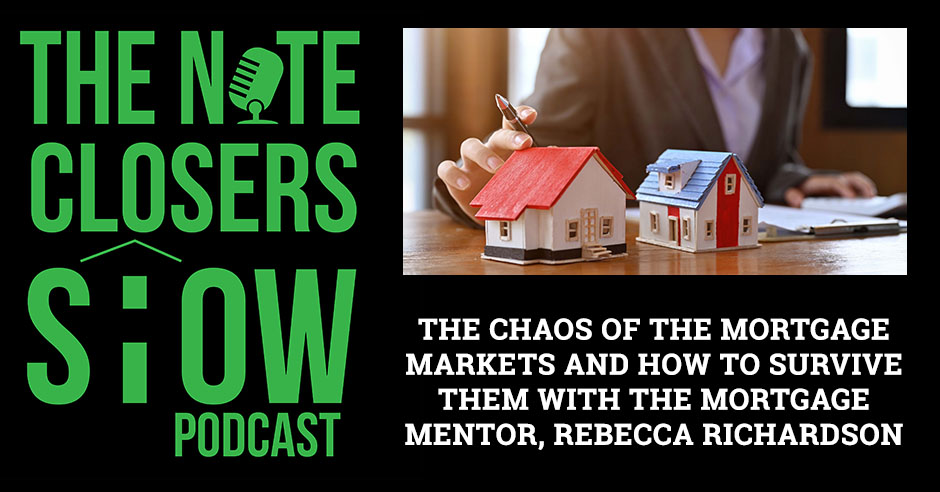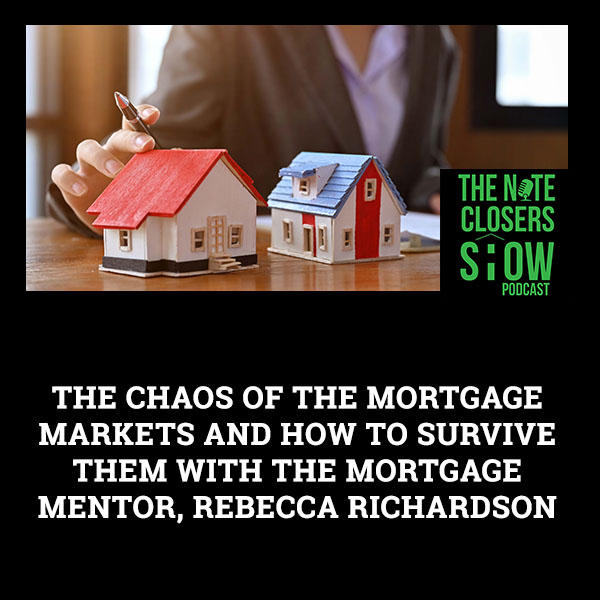
What is there to know about mortgages in real estate? You need to know a couple of important about mortgage markets before you plunge deep into them! In this episode, Scott Carson talks with Rebecca Richardson (aka the Mortgage Mentor) about the current mortgage markets and what she sees as a residential lender across 30 states. She shares how social media helped expand her market across the states. Rebecca wants everyone to have the information they need to make smart decisions that work for them and feel empowered and educated. Tune in to this episode with Rebecca as she brings more insights.
—
Watch the episode here
Listen to the podcast here
The Chaos Of The Mortgage Markets And How To Survive Them With The Mortgage Mentor, Rebecca Richardson
I am jacked up. I’ve got a special guest that’s going to probably have a lot of answers to your questions out there. Not only for you guys that are investors but also those of you that are homeowners or looking to buy a new place, trying to figure out what the hell’s going on in markets. What are the interest rates? It’s a crazy chaotic time a little bit. While we like to see interest rates going up as note investors, it’s not always the best thing for consumers out there. Everybody out here I know of is either a homeowner or a property owner looking to buy.
I’ve got a very special guest with over twenty years as a loan officer. She’s licensed in at least 25 to 30 states. She is known as The Mortgage Mentor and so we are excited to get her on. She’s going to demystify the mortgage process and she is a big advocate of financial literacy across the board. You can find her on TikTok and other places out there for you. We are honored to have the amazing Rebecca Richardson, join us here on the show. What is going on, Rebecca? How’s your day going?
I am great. I appreciate you having me. I feel like we’re two sides of the same coin or something.
We were talking about how she got her license back. You got your first loan officer’s license back in 2001. It was the same year I did. We talked a little bit about both sides of the coin. I’m excited to have you here. After we met in Orlando at FinCon and I’ve done some reconnaissance, I was like, “With everything going on in the market, you’re a perfect guess for what’s going on.” I asked you at the beginning. Is it a little chaotic? Are you seeing people scared to pull the trigger on a lot of new mortgages or refinances out there?
It comes back to personal finance. For some people, it’s the changes in the rate, the market softening and all of that kind of stuff. Some people think, “This is another crash. This is happening. I don’t want to catch a falling knife and I’m out. I’m going to sit on the sidelines and wait it out. I’m going to wait for the bottom.”
Other people say, “There’s less competition. We don’t have the insane market that we had in 2020 and 2021.” I didn’t want to pay $50,000 over a contract or the list price anyway. I didn’t want to have to waive inspections, appraisal and all that insanity. I’m paying a higher interest rate but I can potentially get the house that I want in the way that I want or it can be more of a win-win and equal transaction. It depends because psychology and emotions play a lot into our money. With this volatility, we’re seeing heightened emotions on both ends of the spectrum. Some people think that it’s a win. Some people think that it’s market Armageddon. It’s based on their perspective, to be honest.
I don’t think we’ve ever seen a market switch from a seller’s market to a buyer’s market quite as fast as we have. There was an article out that came about how there’s four times the amount of inventory than there was and that’s the fastest back before 2001 when we both got started.
What we’re seeing is based on the technicals, we’re not necessarily truly in a buyer’s market yet but it’s because it was a market mania. The pendulum had swung so far over to one side where we had in some areas less than a month and a half of inventory and there’s nothing out there other than what’s left is trash to, “The homes are on the market for 30 days.” That’s normal. I think because so many people also got into the business in 2020 and 2021, both on the mortgage and the real estate side. It probably does feel like a crash because it’s not that sugar-high rush of what we had but this feels like a more normal market.
There’s always something going on with the market. After doing this for as long as I have, there are always some headwinds that we’re facing and this is unprecedented, which is certainly the buzzword for all of the 2020s. Everything is unprecedented. I’m so tired of it but for some of the veterans who have seen it for longer, this is what we’re dealing with. Whom can we help? Whom do we need to educate? What do they need? Who is it a smart decision for? Who is it a risky decision for? Let’s make sure that we educate them on the pros and cons of whatever direction they’re heading.

Mortgage Markets: There’s always something going on with the market. There are always some headwinds that we’re facing.
It’s so true. People are all stressed about it at 6%. I’m like, “Many years ago, the normal rate was 6%.”
My first house was at 7%. The loan officer had promised us 7% and then tried to lock us at 7.25%. I was a first-time home buyer. I am not a loan officer yet and our realtor did stand up for us. It was like, “No, you said 7%. That’s what you need to honor.” This is back in the days when there weren’t a whole lot of checks and balances but housing affordability continues to get worse because of wages and home prices.
All things considered, it’s hard to remember or sometimes hard to swallow the fact that the 2% and even honestly the 3% and some of the low 4% aren’t technically based on the coupons and bonds that they’re based on. That’s not what the rates should be. They shouldn’t. The Fed printed money as fake money. That is not normal. The 5% and 6% are more normal.
If you’re buying a house that’s a little overpriced or you’re coming out of pocket $50,000, $60,000 over appraisal, if you’re going to be there a period, even with a price reduction, a correction or a crash like what we’re seeing, you’re there for the long haul. You’re not making a twelve-month flips decision that’s you are going to get penalized.
2020 and 2021, although people treated it like it, was not a market to speculate it. If it’s a long hold, sure. Why not? I need somewhere to live. I might be overpaying for this house but at least I know that my payment’s pretty stabilized and I’m not at the whim of a landlord who might jack it up indiscriminately. That’s the decision but as far as turning into, what I always pictured was that it was that old TV show like the grocery grab where people are running through the store with their carts and they’re like, “I have to get it.” I was like, “I have to get a house.” I was like, “Why?”
It’s good to have that calm down because there were points in the market where it made me sick for buyers because they were having to put in 5, 7 and sometimes, double-digit offers. I am feeling that they had to sell their shirt to even get a chance. I don’t like the way that feels. A good thing is when it is truly a win-win. The seller isn’t being taken advantage of. The buyer isn’t taken advantage of. It’s, “I have something to sell that you want. Let’s come to a reasonable agreement.” It’s a win-win. Those markets are good.
You got to have a win on both sides to make it worth a good thing. Otherwise, somebody’s going to get taken advantage of. Somebody’s going to walk away with hurt feelings or in a bad situation. Are you still seeing some of the crazy programs? Bank of America had a program. It was 2020 or 2021 when they were doing up to 10% of $10,000 towards closing costs. They were covering the down payment on FHA. People were getting into programs with nothing out of pocket that were subpar credit-wise. Are you still seeing programs like that out there?
No. That was probably one of the community reinvestment, the CRA loans that they’re required to do. Bank of America came out with its new program that is available here in Charlotte. It’s in Houston, if I remember correctly, as far as Texas and a couple of other markets that are looking to target some underserved communities. There was a lot of hate for that program. Once I got into some of the details, I was like, “This isn’t a bad program.”
You have the ability to repay. You have to demonstrate that you have the ability to repay. There are some credit standards. There are reasonable underwriting standards, debt-to-income and all those kinds of things. That’s why it’s called a Community Reinvestment Act. There is a place for those types of loans like low to no down payment when there are backstops to make sure that somebody isn’t blowing their budget out of the water to make sure that it leads to good home ownership. It has to go beyond getting that mortgage or tick on reporting back to the agencies. “We did it. We closed our CRA loan.”
I’m like, “Yes and what happens in 6 or 12 months from now?” I don’t hate that program. I haven’t done a lot of content on it because I have not seen the full guidelines and I don’t want to mislead somebody either that they think that they could qualify when they couldn’t or vice versa. However, we’re not seeing a whole lot of crazy programs like that because those of us who have been around or were originating through the crash and the industry through the crash and particularly the people that then bankrolled the fallout from that, those lessons were learned. For the people that don’t learn their lessons and are focused on profits and greed, there are backstops from the standpoint of regulations that take a lot of the riskier aspects of loans that were available previously.

Mortgage Markets: For the people that don’t learn their lessons and are just focused on profits and greed, there are backstops now, from the standpoint of regulations, that take a lot of that risk or take a lot of loans that were available previously.
We track a lot of the stuff with the different banks and their default rates, what they file, with the Fed and the FDIC every quarter and see some stuff. We were seeing it. Those programs did have a higher default rate with everything. As they were offering after about six months, we saw some of those. We’ve had some other banks that reached out to us to buy their stuff on some of that community involvement stuff. We look at it and we want to work with the bar and stuff like that but we still got the numbers that we’ve got to hit as well out there. Our biggest goal is always to try to keep people in their houses.
That’s what we saw through the pandemic with the forbearances. Sometimes that’s kicking the can down the street but I was very glad because on the origination side when we saw this wave coming and you feel that anxiety bubbling up, I was glad that the speed at which the forbearance guidelines and all those things rolled out. It was not done flawlessly because I’m sure you see some but for the most part, that was the right approach. Take some of those lessons learned because I feel like in 2008, it was like, “Don’t care, foreclose standard process.”
However, because of everything with the pandemic, that was not isolated to even a region or individual homeowners. It was something that everybody was going through. Our government, the agencies and companies have realized to do as much as possible to help that homeowner regain their footing and stay in their home. It helps everyone like homeowners, the community and the bank, as much as possible to not have as hard of a hammer and find some ways to pivot.
I expected us to almost have another rollout of the Hardest Hit Funds that we had back in the day in the four states but they went all across the country like, “That’ll work. In 18 to 24 months of nonpayment, you need it.” I get it but we’re starting to see that the piper needs to get paid now aspect of things.
That is part of it. I’m glad that it was available for the people that needed it. For the people that used it as an elective choice, paying the piper is coming with a surprise at what that cost was.
How much do you play on the non-QM?
We have a ton. We have some specialists on our team that primarily handle that just because that is a niche thing. It’s good when it’s there but it’s not necessarily something that I seek out because we’re all creatures of habit but there’s a time and a place. The same thing as sometimes people will talk about DSCR loans for investment properties or bank statement loans. It’s like, “This is 2008 all over again.”
I’m going to tell you a story of when it was 2007 and I worked for a mortgage banker. Primarily, we closed our stuff but we had some broker relationships and it was mainly for subprime-type things. This AE, Account Executive, was walking down the hall, stuck their head in and said, “I’ve got a 100% investment loan for a 580 score. Call me if you got anything. See you around.” I was, “That sounds horrible.” A lot of the difference is more skin in the game and higher credit standards.
Even though it might be an alternative and there might be some alternative way to calculate it, there are still some calculations for the ability to repay versus “You can fog up this mirror. Awesome. We would love to give you a mortgage. Would you like to?” It seems subtle but it’s a pretty significant difference.
Let me ask you about that. The biggest thing when they came out with that is you as the loan officer, you’ve got to determine if they have the ability to pay this in three years. I was like, “So much can happen in three years. If I had a crystal ball for three years, I’d be in Vegas all the time.” Let’s talk about this. I get a lot of questions from folks about that. What are some of the things that you have in place or have to do to determine that aspect? We talk of extended job history or income. That’s already looking at underwriting anyway when you’re evaluating a bar.
It is tighter underwriting standards or more from the standpoint of some of the things. For example, I’ll use traveling nurses. We saw a big uptick in that in the last few years. They can make some serious bank. I’m like, “Go get that bag. Do it.” However, what is difficult sometimes to reconcile on the borrower side and sometimes even on the lender side is we know that the need is there steady for nurses. We know that they’re making sometimes twice what they made when they were on staff.
We know that it’s going to continue but we don’t have that history because it is considered variable income that it can get a lot difficult. It moves people over into that self-employment status or side hustles or side jobs. You have to have a long history. You have to show that it is consistent and it’s not a flash in the pan or something that’s particularly short-lived for just the purposes of qualifying. What we’re starting to see is those kinds of things getting into tighter guidelines around variable income and self-employment falling under that. Also from the standpoint of, “Where’s your down payment coming from?” I don’t know if you remember AmeriDream or Nehemiah where the seller could essentially like fund the down payment for the buyer. Not so much.
I’m sure you are still a sourcing season for that down payment too, right?
Yes. It’s like, “We want to know where it’s coming from.” You didn’t borrow it. You didn’t steal it.
You aren’t selling crack or rock on the side.
That’s awesome that you say that you’re a crypto expert but I’m going to need some kind of paperwork for that. From that standpoint, there’s not one silver bullet that will insulate us from any kind of large market swings because that’s why they’re called black swans. For the most part, I do feel like there have been a lot of lessons learned from those mistakes that were made.
Although sometimes they can be in absolute pain and I’m thinking about things like Disclosure and some of those guidelines or compliance rules that seem to make no common sense. It is there for the protection of the buyer. Even though it might be a nuisance on my side, I’m behind it because it does stop some of the predatory practices to buyers.
Some of the lenders out there were faking their W-2s and bank statements. It traces back in the day and that was stupid stuff.
I once had a processor that told me. She was like, “The company I worked for before had blanked W-2s in their drawer.” I was like, “I wished you hadn’t told me that. I am going to be thinking about that for apparently the next twelve years.”
If you start hearing some of these stories, you’re like, “What were they thinking?”
That’s the thing too. We’re going to get into it a little bit but the comments that you get on social media and people are like, “I read the Big Short.” I’m like, “That’s cool. That’s nothing like what my experience was in the mortgage business.” Even when I went to go see the movie with my mother, she turned to me at one point and was like, “Is this what it’s like?” I was like, “Not for me. I’ve got a 4-year-old and a 1-year-old. I’m not jetting off to Vegas and throwing stuff all over the place. This is not what I do.” A lot of that has been weeded out.
You mentioned side hustles. We’ve seen a side hustle economy spring up with Uber, delivery drivers and Airbnbs. How has that affected somebody who tried to get a house? Do they have to be doing it longer with more consistency? How do you evaluate that? Is it like an investment where they’re getting 65% credit when they’re bringing in a rental?
The short answer is typically they have to have two years. Most of that income is going to show up on their Schedule C because they’re going to get 1099. We’re going to see Schedule C and pretty much what their net is. Some things can sometimes be written off and being able to be added back but for the most part, it’s that net number.

Mortgage Markets: Some things can sometimes be written off and then being able to be added back.
It’s tier history. It’s that net number. The thing that I always want people to know is that the income that you earn from that can be used for the down payment, even if you don’t have that two years. Sometimes we are like, “Does that money not count at all?” It counts from an asset standpoint because we know where it’s coming from but we can’t necessarily count that income unless we have a long history.
Where it can hurt is let’s say somebody does an Airbnb and I purchased it now. That is only going to show as a debt until I file my taxes and I have some kind of income against it because that’s going to be different from a long-term lease. With that, at least, I’ve got some kind of lease. With Airbnb, I might want Airbnb because pound for pound, that’s more profitable for me but I have to have a long history to show that it’s profitable versus having a contract. With relative assurances, we know that we’ve got however much coming in every month and at least I can count on a percentage of it to offset the debt.
That’s where sometimes that can be a short-term hindrance because it only shows up on the liability side or somebody does have a side hustle and they’re like, “This is great.” They’ve been on accounting talk or fake accounting talk and think that everything can be written off. Unfortunately, that side business shows up as a loss. Even though, yes, to their household cashflow, maybe it is adding to that cashflow but on paper and since taxes and documentation rule the world, it’s a loss. That’s where people can get hemmed up.
That takes me to my next question. You bring it up there. I won’t say liar loans because there are no liar loans. They used to be a stated. What kind of non-tax return loans are you seeing? Is it more of an 80% first or 95%? They’ve got decent credit.
Is it like the, “I’m self-employed but I don’t show it on my taxes?”
Exactly.
The alternative to that is would be a bank statement loan. It is riskier. That’s why the down payment has to be higher. If you’re self-employed and the income that you document is the income that we can use to qualify, then we’re looking at the standard, conventional loans. If you’re a first-time home buyer, you can put as little as 3% down.
You go from that into a bank statement loan where we are documenting the cashflow that’s coming in via the bank statements, either in 12 months or 24 months. We’re meeting some of that ability to repay in the spirit of the ability to repay. We’ve got some kind of documentation there but then you’re looking at higher credit scores required, higher down payment and higher rates to compensate for the risk. That’s where we’re seeing that trade-off.
With everything going on in Florida, with Ian and stuff like that, how does that affect origination or underwriting in a state like Florida for you?
For the most part, what that looks like is when counties have been identified by FEMA, then we have to go in and do a re-inspect. It means that the appraiser has to go out and say, “The house is still there. It’s still looking good.” That’s for stuff that’s in process.
When you’re talking with folks that are looking to get a house, refinance or buy a new house, do they have to have a clear mortgage payment history of at least 24 months or no misses or late payments in 12 or 24 months?
Most loan programs will allow a 30-day late. If it shows financial mismanagement that there are rolling lates or stuff like that, then that’s a bigger thing. If it is like, “I switched bank accounts in autopay and it got off sync,” that’s a different thing. You’re taking it on the credit score. A one-time thing isn’t going to kill the deal.
That’s one of the most important things because when we deal with so many distressed borrowers, we’re always like, “If the bank that we’re buying that note reported you’re late for six months, you’re not going to go be able to get a new loan to refinance this out.” You’re not going to be able to get a traditional loan. You’re either dealing with guido to give you some cash or a hard money loan or something like that but it’s not going to be something out there. I wanted to bring that up for everybody here because we get folks, “I’m going to have my borrower refi me.” No. For twenty more months, you’re not.
You’re getting to the point of having so many late that it’s almost treated like it was a foreclosure because it was truly pre-foreclosure and they’ve caught up to it yet. We do get pretty deep into the history, particularly on mortgages, which makes sense.
How is that affected you with refinances of folks that took advantage of the government programs? We know that FICO didn’t report them as late if they went on a forbearance plan for 90 days but it was a different classification. Credit was pulled or something like that. Are you seeing some of that pop-up in 2022?
Not as much. That was more of something that we were running into in 2021 because people were coming out of the twelve months if they took it right in the spring of 2020. That was more of a factor depending on what they were doing. If they were selling and buying, that wasn’t an issue for most loans. I’m generalizing. If they were refinancing, then for most loan types, they had to have at least started making payments for three. That’s showing that whatever the situation was that made you feel like you wanted to take advantage of the forbearance option, it’s gone. You’re good. The job is stable. Everything’s fine. Let’s demonstrate that through some on-time payments and we can move forward.
Let’s talk on the investor side here a little bit. Are you seeing a lot of investor loans? If somebody’s trying to refinance or pull cash out of investment property, what kind of LTVs are you seeing?
We’re seeing some of that. It gets rich the higher you go in the LTV on investment to back up half a step. There was so much speculation about second homes. It was like, “How many second homes do you need?” The agencies or FHFA came out with a change to the loan level pricing adjustments so essentially it’s like, “How is a rate priced?” For loans that are going to Fannie and Freddie, how much risk is built in based on credit score down payment, loan type or loan purpose? When that shift was made for second homes? Pretty much up until that point, rates for second homes were almost the same as primary.

Mortgage Markets: Rates for second homes were almost the same as primary.
That is a great deal. If you’re buying a beach house or a mountain house, go for it. Do it. Yes, it is a second home and you can rent it out all day long but because of FHFA, a couple of things we’re going on there. We’re not getting enough pieces of that pie. We have a housing inventory issue. We are not properly pricing these loans for the rest. If somebody can’t pay their bills, they’re going to let that second home go before they roll their primary and it wasn’t getting priced out that way.
When that went into effect and raised rates to be pretty much in line with investment properties, it cooled off very quickly because it wasn’t cheap money. It’s a financial decision. The pros and cons of that are a lot of times, homes that people are buying as second homes aren’t necessarily the same homes that somebody’s going to be buying as a primary. That didn’t put a dent in that but it did calm down a little bit of the market mania and some of the speculation because that can be a ticking time bomb.
How are you with rent rates going on across the country? In some places, it’s 40% and 50% a year in Austin, Texas. We had the highest percentage rate. It was 90% and I was like, “That can’t be right.”
I don’t want to be the first in that.
Good on one side and bad on the other side. It makes it unaffordable for people to live like what’s been going on in San Francisco, LA and San Diego for quite some time but how is that affected? Are you still taking 60% or 70%? If somebody’s got a rental portfolio of 5 to 10 properties and they’re looking to refinance, what kind of percentages are you looking at as far as the cashflow on that?
We don’t necessarily take a percentage unless it is a contract for a property that doesn’t yet show on taxes. In my example, if I bought a property now and I’ve got a lease now, that’s great. I can count on 75% of that rental amount not exceeding whatever the mortgage payment is. It’s net zero. I can’t show it as a profit until I show a profit on my taxes. For the most part, when we’re looking at properties, what we’re looking at is deferring back to the tax. What’s showing the taxes?
What were the gross rents? What were the write-offs? What’s the PITI and add-back depreciation? That’s your profitability for that particular property and match that against the mortgage, there’s your profit or loss. For those individual properties, we have to do it on an individual property level versus a portfolio type-view.
That’s the next question I was going to ask you. Are you seeing portfolio or blanket loans on a portfolio of assets or rental properties available out there? Is ten the max?
Ten is the max under an agency. Ten financed properties unless the subject property, meaning the property that we’re doing the loan on is a primary. For the most part, that’s my bread and butter. I am not to say that those options aren’t out there. I’m quite sure that they are. I don’t want to speak on them because I can’t run them intelligently but on the investor side, what we’re seeing is a lot of institutional investors, the black rocks of the world, the boogeyman of real estate put some pressure on the individual investor or even the small company investor just because how they can approach the market.
Sometimes there can be a lot of backlash from people who are like, “You don’t need 20 to 30 rental properties.” All things considered, as long as the landlord does what they need to do and keep their property in good shape, I’m much more in the corner of those smaller investors versus the institutional because there is still a factor of, “This is my community and I care what happens,” versus, “This is what looks good on the spreadsheet.”
That’s a big thing. You have a lot of those iBuyers and BlackRock going in and overpaying for the property. There’s no way those things were going to cashflow and they’re taking millions of dollars. Two big funds of BlackRock disappeared because they overpaid for assets. That’s the investors that got hosed who invested in those funds to buy that stuff.
It’s Opendoors, Zillows and all of that stuff. We all have our biases of how we see things but the realtors that I respect in the business are like, “This is not good for the seller and our community. You cannot slap some gray paint on something and think that it’s going to fly off the market.” Even when the market was hot, they still weren’t selling. It’s like the rotten apple and the bunch, “Why isn’t that selling?” It’s like, “I can do basic math. Why should you be able to flip it for $40,000 more 3 weeks later?” I’m like, “No.”
As you said, it affects not only the neighborhood but the community. All the cops around the area too. It affects it in a derogatory fashion. A foreclosure is the same thing. It depreciates everything around it for the most part. That rotten apple is a great analogy for it. I’m going to take this a little bit here. What are the things that drive you bonkers when you’re doing a new loan and somebody does something stupid? Maybe the stupidest thing that borrowers do that doesn’t go well for them is getting a new loan.
For the majority of the time, I would not call them stupid because buyers don’t know what they don’t know. We have a lot of guidelines and rules that fly in the face of common sense. I’m trying to give all the grace for that. I get to be the translator. It comes off the table. This is just the rule. Sometimes the rules don’t make sense but give all your cards or whatever it is. The thing that I’m seeing is cash deposits are probably the thing that comes up that is the most disruptive and makes the least sense.
The message is always, cash is king, all this is great and all of a sudden, we have a deposit that shows up from, I don’t know where and we can’t source it but I didn’t know that until I got your bank statements. We need that money because that’s what you use to pay the earnest money. It turns into this feedback loop of chasing imaginary money or how we work around it. It’s very difficult to be like, “That is great that your grandma took $7,000 out of the safe in her living room and gave it to you and you deposited it into your account.”
This is a real situation but that money doesn’t count. We cannot use that. It’s like, “It’s money and it’s there. It’s my grandma’s. You said she could give me money.” I was like, “Yes, but remember when I said that she had to give you a check or wire it?” Cash is not that. That’s probably one of the biggest things.
That’s legally laundering, isn’t it?
I don’t know. I’m an attorney’s daughter so I’m like, “You say launder,” and I’m like, “I’m gone. I’m not here for that.” In real life, it happens. Somebody’s like, “I’m getting home. I’m doing all this stuff. This is great.” You get spun up in the emotion and excitement of buying a home. That’s what I want for somebody. Getting the mortgage can be a drag.
My team and I work hard to make sure that it’s transparent and accountable. We try to make it as smooth as it can be and all that kind of stuff. They’re chugging along and thinking, “We’re moving into the house in fifteen days. I’m so excited. I got my paint colors and Pinterest board. I need a washer, dryer and fridge. We should have that new living room couch.” They go out and open up a twelve-month zero interest.
That’s a good financial decision. “Why would I spend my money now if I can borrow it for free for a year?” All of a sudden, that swings. “Do you want to tell me about this inquiry for Rooms to Go and what you did?” It’s cash deposits. New accounts on credit are a lot of times the things that trip people up or the last one is job changes. We’re having the Great Resignation, the quiet quitting or whatever we’re branding it as. People are using this environment to improve their situation and get a new job to be able to level up. That is fantastic.

Mortgage Markets: If we’re having a great resignation or quiet quitting, that’s because people are using this environment to improve their situation, to get a new job to level up.
Most of the time that’s not an issue but sometimes it is because they might move from salary to commission. If they’re going to make a lot more in that job, that’s fantastic but you haven’t made it yet. Those are the things that I don’t expect people to think about because they just don’t know but they can make things go sideways very quickly.
How much of what do you think is counseling, educating or holding hands through the process?
That’s a lot of what I do and that’s also because I enjoy it. What I always tell people is my first home-buying experience, although it was a great financial decision, was a horrible process. Since then, I have been trying to avenge that bad process because I believe very much in the power of real estate. Most Americans grow their wealth through real estate so I want people to have the information that they need to make smart decisions that work for them and feel empowered and educated.
Also, not that they’re at the mercy of whomever they got hooked up with and hopefully, they’re good, ethical and all of those kinds of things. I lean into that education a lot because I know what it felt like to trust somebody and then it did not go well. It is a lot of that. It is education and handholding. Sometimes people will ask me a question and I’ll say, “I’m sorry. This is a dumb question.”
I’m like, “Tell me what you do.” They’ll be like, “I’m a welder.” I’m like, “That is awesome. I don’t know how to wield other than I know that you need a hood. Beyond putting on a hood, you’ve got this gun which sounds super awesome. I would not know where to start.” They don’t do this every day. I do. It’s my job to walk them through.
Do you think that’s what’s helped you lead in such a long tenure? We were talking to a lot of realtors and mortgage brokers that get in on the upside. It’s good making money on the upside. Everybody can do that but when the market turns and changes, that’s where folks that didn’t develop brand recognition or a follow-up or systems in place for their marketing to succeed. What do you think has been the recipe for your success for twenty-plus years?
That’s been a big part of it. The way that I approach clients, the time that I spend with them and my demeanor and my approach to this whole thing build that trust. I hope that it’s very clear that I’m not here to chase a commission check and do whatever it takes and always be closing, all that kind of stuff. My team and I believe in always be educating because if you have, people are like, “Educated buyers.”
If you’re worried about an educated buyer calling you out on your role, then you’re the problem and not your buyer. The more that my buyer knows, the more that my clients know, then the more fun sometimes that conversation can be because then we can get into strategy. It leads to it’s about trust and service.
How much of your social media marketing do you think has helped you over the last few years?
What that has allowed me to do is expand out of my immediate geographic or this market. It’s allowed me to expand into other states, have greater visibility and things like that, which have helped me because then it’s more diversified me other than what’s going on in the Charlotte market or the region.
It also has made me a better loan officer and advisor because it gives me the visibility to see what’s going on in different markets. People might offer a suggestion like, “To make this work, you will want to work with your realtor and negotiate for the seller to pay you closing costs.” I’ll get, “That doesn’t happen in this market. That’s not happening.” Respectfully, yes, it is because I see over 250 loans a year. I’ve got a pretty good pulse on what’s going on in the market. Sometimes that helps to have a different perspective versus a micro approach. I’ve got a more macro view of what’s going on.
What I love so much about the connection is most loan officers are very market-focused. They’re in 1 city or 1 state, at the most and you’re all across the country, which is unique. It is a competitive advantage for you because you’re able to do a lot of things and market. If you guys are interested, you want to check her out. It’s @The.Mortgage.Mentor on TikTok. I’d love to ask you. You started doing TikTok videos. How has that changed for you?
I was doing a video in late 2019 because a lot of the videos that I was doing were evergreen videos on YouTube like what is an FHA loan? What documentation do you need and that kind of stuff? It’s not because I wanted to be a YouTuber or get the plaque because who wants to listen to mortgage information?
Mortgage investing or mortgage lending is sexy.
You said that in our talk. I get excited about it but I don’t expect other people to be excited about it but I underestimated its power of it. That’s how I was dabbling in it but all of that is horizontally oriented. At the time, I had two teenagers that were doing these dances. They’d come in and are like, “What are you doing?” They wanted to understand the sandbox that they were playing in. As a good mother, they were already there to figure out what was going on but where I was interested in it from the perspective of being able to shoot vertical video.
The only reason that I got on there was I knew that it was a good editing tool so you could shoot and edit within the same app so I didn’t have to shoot exterior, use another app and all this kind of stuff. I was only dabbling. I’d make some slice-of-life stuff and then some mortgage stuff. When everything went sideways in March and April 2020, both out in the world and within our industry, it turned into my creative outlet. My right brain broke from all the processing that was going on in my left brain.
I felt like it was good downtime because I could still justify it. It was still for work. I was doing the videos to repost on Facebook and Instagram. People would then leave comments and they were like, “If I didn’t want to use a conventional loan, what could I do? I had bankrupt two years ago. Can I qualify for a loan?” I was like, “I did not expect people to ask me questions. I know that you’re not fifteen.” That created a constant loop of questions, creating more content, which created more questions, which created more content.
Part of the reason I love TikTok is I used to say video-only platform but they’re doing video reels and everything else. It is a video platform so people watch what they’re sound on. Being able to connect with people through video creates a much stronger connection and sense of community than a static post on Facebook or Instagram.
I leaned into that because I like video. I always refer to TikTok as my test lab like, “Here’s this new loan type. Here’s this information. Here’s this concept that I want people to understand. Let me send it out this way and see how people respond to it.” “That got a good reception. I’ll expand on that,” or, “It didn’t hit. Let me explain it this way and see.” I hold the results of it very loosely. It’s more, “Put it out there for whoever needs it,” and then getting that constant feedback and that connection has made it a powerful sense of community and resource for me.
With all the loan officers and originators being let go or businesses closing up, have you had any of those folks reach out to you asking to pick your brain on ways to market themselves or help stay in the business?
For sure, because that’s what happens. We’re all creatures of comfort. It takes a lot of discipline and discomfort to try something new. When life is great and refis are flowing in the door, why would I try something new? People are interested in doing that. Probably the biggest turnoff is when loan officers are like, “How do I get leads from TikTok?”
I’m like, “Don’t,” because that is the digital version of commission breath. Don’t do that. You are there to build a community. That would be like walking into your kid’s scout meeting, your church group or wherever you like to hang out and you’re like, “I got my beer. Who wants a mortgage?” I was like, “No. Don’t lead with that. That kills the vibe.” You have to look at it from the standpoint of it’s about building a community, connection and trust. That takes longer and not everybody has the patience or frankly, the interest of putting in that kind of work.

Mortgage Markets: It’s about building community connection and trust, which takes longer, and not everybody has the patience or interest to do that kind of work.
It is so well-spoken. One thing that’s helped us is constantly investing and getting the word out. Sharing and not doing it to pitch but just to be of service or edutainment, as we like to say.
Edutainment is a great word.
What’s the best way for those listening and watching to connect with you, Rebecca, and reach out to you? Either for a mortgage or refi would be great but also to connect.
On social, I’m @The.Mortgage.Mentor. You can find me on Instagram, TikTok, LinkedIn, YouTube, Google or whatever you want. I’m everywhere. My website is TheMortgageMentor.co. All of that has my contact information and I do love being able to be a resource for everybody. Especially, there are loan officers that want to know how to connect with their community. I’d be happy to help. If you’re going to reach out to me to ask how you get leads off of social media, I’m going to tell you to pound sand. Keep it real and close your deal.
Thank you so much for coming to the show. We look forward to continuing the conversation on some other things. Guys and gals, there is a lot of great information here. There is a lot to unpack. If you’ve got questions about financing, your primary investment or refinancing, this is the gal you need to talk to out there. Reach out to her and take some action. I can tell you how many times people ask me questions about loans. I’m like, “I’m not a mortgage broker. Call a loan officer. Call somebody who knows the business and you’ll get it directly from the source for a direct answer.” Go out, take some action and we’ll see you all at the top. Bye.
Thank you.
Important Links
- Rebecca Richardson
- @The.Mortgage.Mentor – TikTok
- Instagram – The Mortgage Mentor
- LinkedIn – Rebecca Richardson
- YouTube – Rebecca Richardson – The Mortgage Mentor
- TheMortgageMentor.co
- https://www.RebeccaRichardsonMortgage.com/links
About Rebecca Richardson
 With a focus on first-time and move-up buyers, veterans, and clients going through separation and divorce, she differentiates herself with sound technical and guideline knowledge balanced with empathetic and proactive service. She believes in the power of growing personal wealth through real estate and enjoys advising clients on strategies to help them reach their goals.
With a focus on first-time and move-up buyers, veterans, and clients going through separation and divorce, she differentiates herself with sound technical and guideline knowledge balanced with empathetic and proactive service. She believes in the power of growing personal wealth through real estate and enjoys advising clients on strategies to help them reach their goals.
Branding herself as The Mortgage Mentor™ she demystifies the mortgage process and fosters financial literacy on various social media platforms with over 150k followers. She is licensed in over 25 states and enjoys helping clients reach their homeownership goals.
Want to talk to Scott? Book a call with him HERE
Love the show? Subscribe, rate, review, and share!

